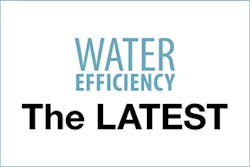The Water Research Foundation Receives $4.5 Million Grant from State Water Board for Recycled Water Use and Reuse
The Water Research Foundation (WRF) has initiated research on future and innovative recycled water uses other than irrigation, including highly refined drinking water, under two grants totaling $4.5 million recently awarded by the California State Water Resources Control Board (State Water Board).
The State Water Board awarded the grant funds to WRF as part of their research program to advance potable and non-potable water reuse applications statewide in a manner protective of public health and the environment. These grants were possible due to a long-term relationship between the State Water Board and WRF, as well as California Legislation that has brought increased attention to direct potable reuse.
In 2010, California Senate Bill 918 was enacted to require the State Water Board to determine the feasibility of developing water recycling criteria for direct potable reuse (DPR). The State Water Board established a DPR Expert Panel, chaired by consultants Adam Olivieri and Jim Crook. In response to SB 918, WRF (then WateReuse Research Foundation) and WateReuse California launched a DPR Research Initiative (2012-2016) that raised more than $6 million, which funded 34 projects to address the technical, operational, and community barriers to DPR.
The DPR Expert Panel utilized this research (valued at $24 million) and a compilation report (Reuse-15-01) to develop their final report, “Evaluation of the Feasibility of Developing Uniform Water Recycling Criteria for Direct Potable Reuse,” which concluded it is feasible to develop water recycling criteria for DPR. The Report identified several research needs that could be conducted concurrently with the regulatory development.
Additional California legislation adopted in 2017 (Assembly Bill 574), requires the State Water Board to adopt uniform water recycling criteria for direct potable reuse through raw water augmentation by December 31, 2023. To help meet that deadline, the State Water Board executed a $1.0 million grant with WRF to conduct the research recommended by the DPR Panel to enhance the understanding and acceptability of direct potable water reuse in California, by improving knowledge of quantitative microbial risk assessments, pathogen monitoring and identifying and treating for unknown constituents in potable reuse projects.
This grant is being managed by Julie Minton and Kristan VandenHeuval of WRF and overseen by a Coordinating Committee, including Jim Crook, Adam Olivieri, Claire Waggoner (Division of Water Quality), Bob Brownwood (Division of Drinking Water), and Julie Minton (WRF) The research consists of five components:
1. Develop and implement a method for Quantitative Microbial Risk Assessment
2. Measure Pathogens in Wastewater
3. Investigate the Feasibility of Collecting Pathogens in Wastewater During Outbreaks
4. Treatment Processes for Averaging Potential Chemical Peaks
5. Assessing methods to identify Low Molecular Weight Unknown Compounds
In addition to funding research to address the specific research recommendations from the DPR Panel, the State Water Board awarded a second grant for $3.5 million to WRF to identify and conduct the highest priority recycled water research needs to expand production and use of recycled water in California in a manner that is protective of public health and the environment. The second grant includes a phased approach where WRF will utilize the Water Reuse Issue Area Team (IAT) to develop and prioritize a list of potable and non-potable recycled water research needs in 2018 and in 2019. This phased approach will ensure that as the scientific information in this field rapidly progresses, that the highest research priorities are identified and funded on an annual basis.
Of the total second grant amount, $2M will be designated for potable reuse research, and $1.5M will be for non-potable reuse. The first two projects under this agreement are being awarded this summer. They address Evaluation of CEC Removal by Ozone/BAF Treatment in Potable Reuse Applications (4832/Reuse 17-04) to synthesize the results of the existing research to develop design and operational guidelines to facilitate the broad implementation of ozone/ biologically active filtration (BAF) in potable reuse applications; and Understanding Wastewater Treatment Performance on Advanced Water Treatment Processes and Finished Water Quality (4833/Reuse 17-05) to help utilities optimize wastewater treatment processes to benefit the advanced water treatment (AWT) train and improve finished water quality. The 2018 suite of projects worth over $2.5M will be released this fall 2018.
The research under both grants will be leveraged by a WRF fundraising effort to advance potable reuse, not only in California but throughout the U.S and world, and to establish potable reuse as a reliable solution to the nation’s water supply challenges and as a sustainable component of integrated water management. WRF invites interested parties to pledge a 1- to 2-year contribution to help us meet its goal of raising $3-4M to leverage the existing State Water Board funds for the research to total $7.5-8.5M. Please contact Julie Minton with any questions.
